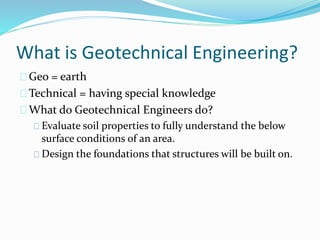The Facts About Geotheta Uncovered
The Facts About Geotheta Uncovered
Blog Article
The Basic Principles Of Geotheta
Table of ContentsThe Facts About Geotheta RevealedSome Known Questions About Geotheta.3 Simple Techniques For GeothetaA Biased View of GeothetaNot known Facts About Geotheta

They perform site examinations, collect samples, do laboratory tests, and examine information to evaluate the viability of the ground for construction jobs - Engineer of Record. Based on their findings, geotechnical designers give suggestions for structure layout, incline security, keeping structures, and reduction of geotechnical dangers. They team up with various other specialists, such as engineers, architectural designers, and building and construction teams, to ensure that geotechnical considerations are integrated into the overall project design and implementation
By evaluating the actions and homes of dirt and rock, they can identify possible geotechnical hazards such as landslides, dirt settlement, or slope instability. Their experience aids stop failings or mishaps that could jeopardize lives and residential or commercial property. Right here are some in-depth tasks and obligations of a geotechnical engineer: Site Examination: Geotechnical designers conduct site investigations to collect data on subsurface conditions.
They translate the information to comprehend the buildings and actions of the dirt and rock, including their toughness, leaks in the structure, compaction characteristics, and groundwater problems. Geotechnical Evaluation and Layout: Geotechnical designers assess the information gathered during site investigations to assess the stability and viability of the website for building and construction tasks. They execute geotechnical estimations and modeling to evaluate variables such as bearing capability, settlement, incline security, side earth pressures, and groundwater flow.
The Only Guide to Geotheta
Structure Style: Geotechnical engineers play a critical duty in creating foundations that can securely sustain the designated structure. They analyze the soil problems and tons needs to figure out the appropriate structure type, such as superficial foundations (e.g., footings), deep structures (e.g (https://geotheta.start.page)., heaps), or specialized strategies like soil improvement. They consider factors such as negotiation limitations, bearing capacity, and soil-structure interaction to create optimum structure layouts
They review construction strategies, screen website tasks, and conduct field evaluations to confirm that the design suggestions are adhered to. If unexpected geotechnical problems occur, they assess the scenario and offer recommendations for removal or modifications to the design. Danger Assessment and Reduction: Geotechnical engineers evaluate geotechnical threats and dangers connected with the job site, such as landslides, liquefaction, or dirt erosion.

Partnership and Communication: Geotechnical designers work closely with other specialists associated with a project, such as designers, structural designers, and building groups. Reliable communication and Full Report cooperation are vital to incorporate geotechnical factors to consider into the overall task design and building and construction process. Geotechnical designers supply technological proficiency, response questions, and guarantee that geotechnical requirements are satisfied.
Some Known Questions About Geotheta.
Right here are some kinds of geotechnical designers: Structure Engineer: Foundation engineers concentrate on designing and examining structures for frameworks. They assess the dirt problems, tons demands, and website features to figure out one of the most suitable structure kind and design, such as shallow foundations, deep foundations, or specialized strategies like stack foundations.
They examine the aspects affecting incline stability, such as soil homes, groundwater conditions, and slope geometry, and create approaches to avoid incline failures and reduce dangers. Earthquake Engineer: Earthquake designers specialize in evaluating and developing frameworks to hold up against seismic pressures. They examine the seismic threat of a website, review soil liquefaction possibility, and establish seismic style requirements to make certain the safety and security and strength of structures during quakes.
They do field testing, gather examples, and assess the gathered data to identify the dirt homes, geologic developments, and groundwater conditions at a site. Geotechnical Instrumentation Designer: Geotechnical instrumentation designers focus on tracking and determining the behavior of soil, rock, and structures. They install and maintain instrumentation systems that check factors such as soil settlement, groundwater levels, incline activities, and structural displacements to assess efficiency and give early cautions of prospective issues.
Excitement About Geotheta
They conduct tests such as triaxial examinations, consolidation examinations, direct shear examinations, and permeability tests to gather data for geotechnical analysis and layout. Geosynthetics Designer: Geosynthetics designers concentrate on the layout and application of geosynthetic products, such as geotextiles, geogrids, and geomembranes. They make use of these products to boost soil security, reinforce slopes, supply drainage solutions, and control erosion.
They tend to be investigative individuals, which means they're intellectual, introspective, and analytical. They are interested, methodical, logical, logical, and sensible. Some of them are additionally social, indicating they're kind, generous, participating, client, caring, practical, compassionate, tactful, and friendly - Tailings Engineer.
In the workplace setting, geotechnical designers make use of specialized software tools to carry out estimations, develop styles, and examine data. They prepare reports, evaluation job requirements, connect with customers and employee, and coordinate job tasks. The office setting supplies a favorable atmosphere for research, analysis, and partnership with other experts entailed in the task.
The Only Guide to Geotheta
They often visit job websites to conduct site examinations, assess geotechnical conditions, and collect data for evaluation. These gos to entail taking a trip to different areas, sometimes in remote or challenging surfaces. Geotechnical designers may carry out dirt tasting, conduct tests, and display building activities to ensure that the geotechnical elements of the task are being implemented correctly.
Geotechnical designers additionally function in specialized geotechnical labs. Geotechnical research laboratory designers function thoroughly in these atmospheres, taking care of testing devices, operating tools, and tape-recording information.
Report this page